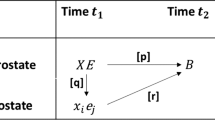Abstract
Recent debate on the nature of probabilities in evolutionary biology has focused largely on the propensity interpretation of fitness (PIF), which defines fitness in terms of a conception of probability known as “propensity”. However, proponents of this conception of fitness have misconceived the role of probability in the constitution of fitness. First, discussions of probability and fitness have almost always focused on organism effect probability, the probability that an organism and its environment cause effects. I argue that much of the probability relevant to fitness must be organism circumstance probability, the probability that an organism encounters particular, detailed circumstances within an environment, circumstances which are not the organism’s effects. Second, I argue in favor of the view that organism effect propensities either don’t exist or are not part of the basis of fitness, because they usually have values close to 0 or 1. More generally, I try to show that it is possible to develop a clearer conception of the role of probability in biological processes than earlier discussions have allowed.
Similar content being viewed by others
References
Abrams M. 2000. Short-Run Mechanistic Probability. Presented at the Philosophy of Science Association, Seventeenth Biennial Meeting, Vancouver BC, Canada, November 2–5, 2000, http://hypatia.ss.uci.edu/lps/psa2k/short-run.pdf.
Abrams M. 2005. The Causal Structure of Biological Fitness, MS.
Beatty J. (1984). Chance and natural selection. Philos. Sci. 51:183–211
Beatty J. and Finsen S. 1989. Rethinking the propensity interpretation: A peek inside Pandora’s box. In: Ruse M. (ed.), What the Philosophy of Biology is? Kluwer Academic Publishers, pp. 17–30
Bennett J. 1988. Events and their Names, Hackett.
Bouchard F., Rosenberg A., (2004). Fitness, probability, and the principles of natural selection. Brit. J. Philos. Sci. 55(4): 693–712
Brandon R.N. (1978). Adaptation and evolutionary theory. Stud. Hist. Philos. Sci. 9(3):181–206
Brandon R.N. 1990. Adaptation and Environment, Princeton University
Brandon R.N. 2004. The difference between selection and drift: A reply to Millstein. Biol. Philos. 20(1): 153–170
Davidson D. 1967. Causal relations. J. Philos. 64
Eagle A. (2004). Twenty-one arguments against propensity analyses of probability. Erkenntnis 60:371–416
Fetzer J.H.: 1981, Scientific Knowledge: Causation, Explanation, and Corroboration, Boston Studies in the Philosophy of Science. D. Reidel
Giere R.N. 1973. Objective single-case probabilities and the foundations of statistics. In: Suppes P., Henkin L., Joja A. and Moisil G.C. (eds), Logic, Methodology and Philosophy of Science IV. North-Holland, pp. 467–483
Gillespie J.H. 1998. Population Genetics: A Concise Guide. The Johns Hopkins University Press
Gillies D.A. (2000). Varieties of propensity. Brit. J. Philos. Sci. 51:807–835
Glennan S. (1997). Probable Causes and the Distinction between Subjective and Objective Chance. Noûs 31(4):496–519
Graves L., Horan B.L., Rosenberg A. (March 1999). Is indeterminism the source of the statistical character of evolutionary theory? Philos. Sci. 66:140–157
Jackson, F. and P. Pettit: 1992, ȁ8In defense of explanatory ecumenismȁ9. Econ. Philos. 8(1): 1–21
Levi I. (1983). Review of studies in inductive logic and probability. Phil. Rev. 91:116–121
Lewis D. 1986a. Philosophical Papers, Vol. II. Oxford University Press
Lewis D. 1986b. Postscripts to ‘A Subjectivist’s Guide to Objective Chance’. In: Lewis (1986a)
Mellor D.H. 1971. The Matter of Chance. Cambridge University Press
Miller D.W. 1994. Critical Rationalism: A Restatement and Defence, Open Court
Millikan R.G. 2000. What has natural information to do with intentional representation? In: On Clear and Confused Ideas, Cambridge University Press, pp. 217–237
Mills S., Beatty J., (1979). The propensity interpretation of fitness. Philos. Sci. 46(2):263–286
Millstein R.L. (2003). Interpretations of probability in evolutionary theory. Philos. Sci. 70:1317–1328
Popper K.R. 1957. The propensity interpretation of the calculus of probability, and the quantum theory’. In: Körner S. (ed.), Observation and Interpretation. Academic Press Inc., Butterworths Scientific Publications, pp. 65–70
Popper K.R., (1959). The propensity interpretation of probability. Brit. J. Philos. Sci. 10:25–42
Putnam H. 1975. The meaning of ‘meaning’. In: Mind, Language and Reality, Cambridge University, pp. 291–303
Rosenberg A. 1994. Instrumental Biology or the Disunity of Science, University of Chicago Press
Rosenberg A. (December 2001). Discussion note: Indeterminism, probability, and randomness in evolutionary theory. Philos. Sci. 68:536–544
Rosenberg A. and Bouchard F. 2004. Matthen and ariew’s obituary for fitness: Reports of its death have been greatly exaggerated. Biol. Philos. 20(2–3): 343–353
Roughgarden J. 1979. Theory of Population Genetics and Evolutionary Ecology: An Introduction. Macmillan
Sober E. 2000. Philosophy of Biology, 2nd ed., Westview Press
Sober E. 2001. The two faces of fitness. In: Singh R.S., Krimbas C.B., Paul D.B. and Beatty J.␣(eds), Thinking About Evolution. Cambridge University Press, pp. 309–321.
Strevens M. 2003. Bigger Than Chaos: Understanding Complexity through Probability, Harvard University Press.
Weber M. (2001). Determinism, realism, and probability in evolutionary theory: The pitfalls, and how to avoid them. Philos. Sci. 68(3):S213–S224
Author information
Authors and Affiliations
Corresponding author
Rights and permissions
About this article
Cite this article
Abrams, M. Fitness and Propensity’s Annulment?. Biol Philos 22, 115–130 (2007). https://doi.org/10.1007/s10539-005-9010-x
Received:
Accepted:
Published:
Issue Date:
DOI: https://doi.org/10.1007/s10539-005-9010-x




